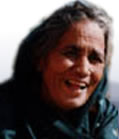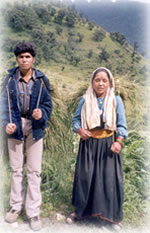 |
 |
||
 |
|||
|
RELATED THEMES community activities education gender migration social relationships traditional skills OTHER LOCAL THEMES BACKGROUND |
social change
He adds: "The new generation is neither prepared to learn from the old one, nor does it quite do the right thing to achieve its desired material gains. It is because of this that our social environment is in a bad way today." This sense that these societies are in a transition stage is echoed by another narrator: "This is the transition period. On the one hand people are losing their traditional knowledge and means, and on the other hand they are not getting adequate training in modern scientific techniques. As a result of it they are losing all their assets. That's why I advocate the revival of traditional occupations, measures and methods." (India 8) The dominance of the cash economy and exposure to TV and other media is, say many of the older narrators, making people more materialistic, and less willing to work with others for the community good rather than individual gain. Yet while many criticise the selfishness of modern society, at least one woman, a skilled weaver, recognises that its fast pace has also brought stress and anxiety. India 22: "Though we faced many hardships in life earlier, we were independent. We were not distressed or agitated about anything, unlike today's youth. We were happy. We were never in a hurry over anything. Today there is a lot of competition amongst people, a feeling of wanting to outdo the other. In our times we did the wool work at our own pace." Another (India 10) says: "The generation of today wants returns immediately, it talks of science in books while the earlier generation practised it on the ground." His remark hints at another change: the feeling expressed by the older generation that their knowledge, based on accumulated first-hand experience, is being devalued in favour of that gained by formal education, even when "bookish" ideas conflict with what is demonstrated "on the ground". Not everyone regrets the changes: "Children have got some education, have seen the outside world, so maybe they are ahead of us - not backward. In earlier days we used to cut grass, look after the oxen, fetch grass from the hills. There was nothing else. Now by God's grace our children have seen the world and got good clothes for us, and arrange for our meals." (India 13) And those women who have benefited from the movement for greater equality are quite clear about the improvements this has brought. A few remember with anger the old system of begar, in villagers were forced to supply food and other goods as well as labour for visiting British colonial officers and also, one says, for the local Maharajah. One man (India 3) called this obligation to those in power equivalent to "slavery". Other hierarchies and restrictions of the old society are also changing: "People believed in untouchability. The Harijans had to cover their mouth with their hand while talking so that their breath did not reach the Rajputs. They were not allowed to enter the temples or go to the house of a Rajput.Today it is not so. They can go to temples, visit Rajputs, organise fairs, can dance also." (India 15) And although there is evidence that mutual support networks are less strong, a number of narrators say they have certainly not died out. One group, the Gujjars, has undergone significant change from a semi-nomadic life to a settled one. Two of them explain that both ways of life had their advantages, but now they are happy to make the most of the new, settled existence. "Both [times] are all right. The old people always think that their times were better. Now we want access to good education and every possible thing available" (India 26). "Earlier times were also good.But life was very tough. There was no education and knowledge." (India 27) quotes about social change"People were united [in the past]. If anybody's field remained unploughed, any villager would do it. Nothing was asked in exchange for this. Today no one comes, even on wage, because everyone has become sahibs (people of importance). They think this job is below their status. Recently one of our fellow villagers did not have bullocks, and he was busy in the management of his son's marriage. His fields are still uncultivated. no one thought it their duty to plough his fields." "The main cause [of changed ideals] is the modern, younger man, and the modern media, which is very effective. Even the modern markets are a powerful influence. If our hill men go out to bigger cities, they find the glamour too tempting to resist, particularly for the young men. They get the wrong ideas and feel that a trip to a city teaches you a new style of fashion, eating manners. So they have become quite urban in their style." "The government has brought in changes. [It] wants everyone to work and live alike, everyone should have similar life-style, eating habits. Because of it some people [changed their caste occupation for waged work]. There were Aujis in the village who played instruments, they have taken to some other work and left their traditional work. Now people are ready to leave their traditional work and prefer to pick up new work in order to feel more advanced." |
|
 A number of forces are contributing to social change at a rate, narrators suggest, faster than ever previously experienced. Migration is changing the populations of the villages, as the young and educated leave to find work; it also brings people into greater contact with modern life, ideas and consumer goods. The increase in roads is also bringing the outside world into previously remote areas, and opening up new areas to tourism, commercial activity and potential over-exploitation of resources. Education has become far more available and is changing the expectations and knowledge-base of young people. Many older people regret this, feeling that their communities' connection with the environment is disintegrating and the accumulated knowledge borne of making a living from such complex terrain is gradually disappearing:
A number of forces are contributing to social change at a rate, narrators suggest, faster than ever previously experienced. Migration is changing the populations of the villages, as the young and educated leave to find work; it also brings people into greater contact with modern life, ideas and consumer goods. The increase in roads is also bringing the outside world into previously remote areas, and opening up new areas to tourism, commercial activity and potential over-exploitation of resources. Education has become far more available and is changing the expectations and knowledge-base of young people. Many older people regret this, feeling that their communities' connection with the environment is disintegrating and the accumulated knowledge borne of making a living from such complex terrain is gradually disappearing: